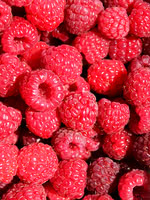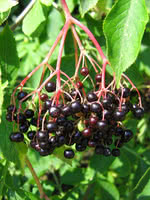Mon-Fri 9am - 5pm Mountain time
Killarney Raspberry vs Black Elderberry
Rubus x Killarney
Sambucus canadensis
NOT AVAILABLE THIS SEASON - MIGHT RETURN
Killarney Raspberry is extremely robust, with some of the best cold and disease resistance available. This could be due, in part, to it being bred in Manitoba.
It is also known for its good flavor and for being firmer than other varieties, which lends to its use in processing like pies, jams, and jellies or for U-Picks.
Killarney Raspberry is a floricane-fruiting variety, meaning it primarily produces fruit on second-year canes (previous season’s new growth). They are also referred to as summer-bearing. In late winter or early spring, cut back all spent floricanes, leaving only last season's canes.
Raspberries are self-fertile, meaning they do not require cross-pollination from another variety to produce fruit.
Black Elderberry is a deciduous shrub native to eastern North America. You can plant this shrub in moist areas and it will help stabilize your soil. You can also use it on rural properties anywhere you'd use a lilac.
Black Elderberries are considered to be partially self-pollinating. So while they will still produce some berries without cross-pollination, planting with another variety will increase yields. Consider planting with Ranch Elderberry or Bob Gordon Elderberry.
Warning: the seeds, stems, leaves, roots, and uncooked berries of the Black Elderberry are poisonous to humans when eaten in quantity. You should cook the berries to make them safe for human consumption.
Killarney Raspberry Quick Facts
Black Elderberry Quick Facts
Toxicity: leaves, stems, and uncooked berries are poisonous to humans

